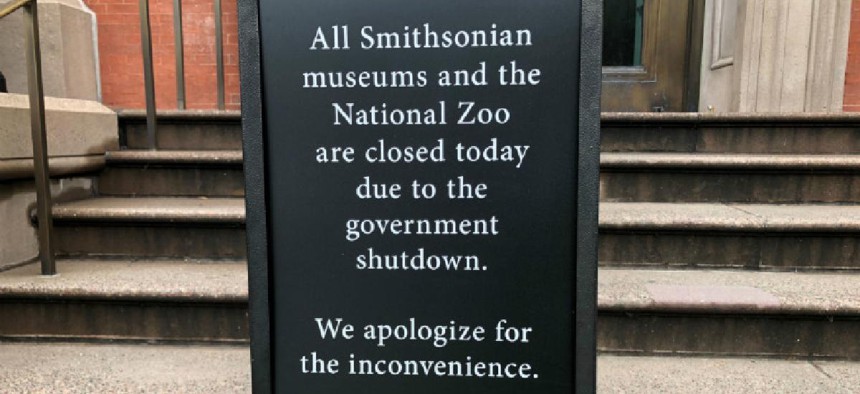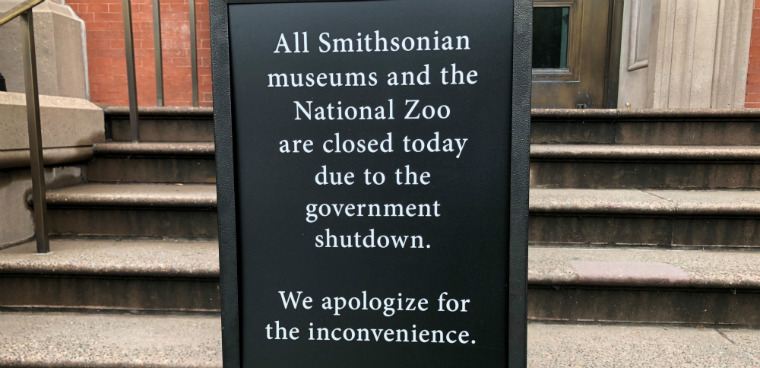Post-election shutdown risk looms

Five weeks separate the November elections and the expiration date on the current stopgap funding measure keeping the federal government operational – and a path to avoiding a shutdown is not entirely clear.

In 2018, a sign outside the Renwick Gallery alerted visitors to the government shutdown. (FCW photo)
Five weeks separate the November elections and the expiration date on the current stopgap funding measure keeping the federal government operational – and a path to avoiding a shutdown is not entirely clear.
Congress and the White House punted funding decisions to Dec. 11 with a stopgap spending bill passed by overwhelming margins by the House and the Senate and signed into law in the early hours of Oct. 1. While there was a push by some in Congress to have a continuing resolution expire next February, after the presidential inauguration, ultimately lawmakers settled on a post-election deadline.
"I think we're in a perilous time for a lot of reasons," Stan Soloway, a former senior Defense Department official and a past CEO of the Professional Services Council, told FCW. "In the case of the budget, there's only one scenario that I can see where we're not going to have a budget problem in December – and that's if we have status quo. If we walk into Dec. 11 with a lame duck Senate and a lame duck president, all bets are off."
The last comparable situation was in late 2018 when there was continuing resolution with a December expiration date combined with a lame duck Republican House of Representatives. That resulted in the longest government shutdown in U.S. history. The public laid the blame for the shutdown on the White House at the time. According to a CNN poll conducted in the midst of the shutdown, 55% said they agreed that Trump was most responsible for the shutdown, with Democrats blamed by 32% and both sides blamed by 9%.
But approval ratings won't mean as much if the shutdown scenario plays out against the backdrop of a Trump defeat.
"President Trump's reckless 35-day shutdown in 2018 inflicted unnecessary harm on federal employees, contractors, and local communities across the country," Rep. Gerry Connolly (D-Va.) said in an emailed statement to FCW. "It would be callous to even threaten repeating that in the middle of a pandemic with millions of American already hurting. For once the President should try and show some empathy and not hold hostage the federal government."
Mike Hettinger, a former senior congressional staffer who lobbies on behalf of technology firms and government contractors, said he's worried about the continuing resolution expiring in the post-election environment.
"Five weeks after the election puts us right in the middle of what everyone expects to be a hot environment politically," Hettinger told FCW. One danger zone would be a defeated Trump "who wants to try to stay in power using a government shutdown as perceived leverage to get something out of Congress and the courts."
Hettinger notes that ongoing COVID-19 pandemic – which could be in the midst of a winter spike when the funding bill expires – might make a shutdown less likely because "it would be so egregious to shut down government, including the Centers for Disease Control and Prevention and the Department of Health and Human Services, in the midst of a pandemic that may be growing."
One thing that is unlikely to happen is Congress passing a slate of appropriations bills. The House has most of its bills in order, minus funding for the Department of Homeland Security and the legislative branch. The Senate reportedly has bills written, but they have not been publicly released or marked up in committee, let alone passed by the full chamber.
New shutdown plans
HHS is preparing for a possible lapse in appropriations. The agency is one of a very few to have updated their contingency staffing plan for a fiscal year 2021 shutdown. The agency, which includes CDC among its many components, hopes to maintain COVID-19 response at current levels even amid a shutdown.
"HHS will use the full extent of the authority under the Antideficiency Act (ADA) to maintain existing HHS activities, including COVID-19 response, research and vaccine and therapeutic development," the document states. "HHS will continue any COVID-19 activities supported by multiyear funding provided in the emergency supplemental appropriations bills."
In the event of a shutdown, CDC will have to do its share of that work with 62% of its employees furloughed – that's 8,295 furloughs out of 13,299 staffers, according to the agency's plan. That calculus could be altered if there is another round of pandemic stimulus and relief that includes funding for CDC and other pandemic response agencies.
The Department of Homeland Security also filed an updated contingency plan with the Office of Management and Budget. DHS, however, fares rather better than HHS when it comes to retaining employees. Just 14% of agency employees would be furloughed under a lapse in appropriations, with 217,601 out of 251,867 employees tagged exempt or excepted because of their work in law enforcement or other functions deemed essential.
While DHS would be close to full strength, its cybersecurity policy and response agency would be gutted by a shutdown. The Cybersecurity and Infrastructure Security Agency would have 344 employees on the job out of more than 2,200.
Contractor guidance
David Berteau, president and CEO of the Professional Services Council, has three basic pieces of advice for contractors facing funding uncertainty: conduct an internal assessment of existing contracts and determine your exposure; initiate conversations with government customers to find out who will be on duty to manage contracts in the event of a lapse in appropriations; and make sure invoices are current and submitted.
Additionally, Berteau advised contractors to close as many deals as possible.
"Maximize what you can get under contract before the CR ends," he said. "if funds are obligated from prior appropriations, the contract continues under the shutdown unless the government stops it."
Ongoing competitions, bid protests and lawsuits will also face delays, said Paul F. Khoury, a partner at the Wiley law firm who specializes in government procurement.
"Understand in these circumstances that things in your business pipeline are going to get delayed if there's a shutdown," Khoury said. He noted that in past funding lapses the Government Accountability Office has taken the position that for every day of shutdown there will be one day of delay on protests. The Court of Federal Claims where bid protest lawsuits are held may provide different guidance.
One thing that remains the same in the event of a FY2021 shutdown: it's unlikely that contractors will be paid for work that is put on hold. On the other hand, federal employees can take comfort that in the event of a shutdown, the Government Employee Fair Treatment Act of 2019 will be in effect. The law guarantees back pay to furloughed employees as well as employees required to work under exceptions, with payment to be made at "the earliest date possible after the lapse in appropriations ends, regardless of scheduled pay dates."



